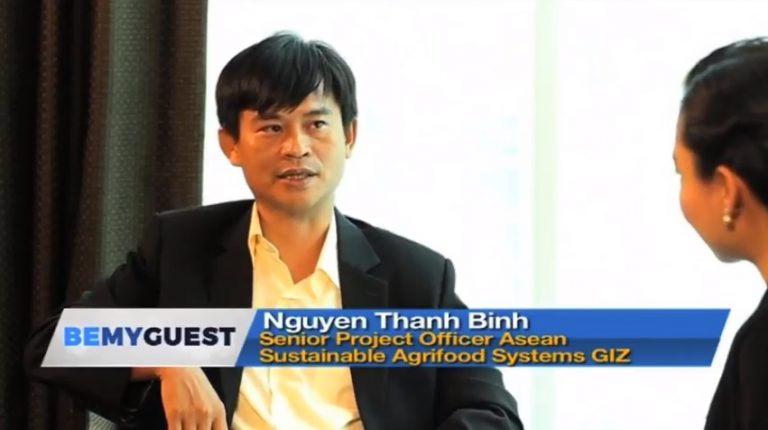Interview with Mr. Nguyen Thanh Binh, Senior Project Officer of ASEAN Sustainable Agrifood Systems
According to Mr. Binh, rice farmers in Viet Nam are quite conservative and have a long history on the use of chemical in agriculture. Because of the over application, pest becomes resistant, and farmers would have to apply more and more chemical in controlling pests. Besides, due to the history of pest outbreak, brown plant hopper to be specific, and fear over the yield loss, farmers spray chemical every time when they see pest. With farmers’ limited knowledge on the affect of chemical to their health and ecology systems, it worsens the situation.
Chemical residue is, therefore, a major issue in Viet Nam’s agriculture. To establish responsible use of chemical, it needs cooperation among all parties involved including local government officers, chemical retailers and farmers. A public-private partnership project, Integrated Pest Management (IPM) sub project under Better Rice Initiative Asia (BRIA), was started in 2015 to give knowledge and skills to the three parties on the appropriate use of chemical in the rice field. The project proves that with the use of IPM, farmers can increase their income through the reduction of chemical input.
 However, there are some challenges. It occurs that the trained technical staff of the local government who become master on the IPM knowledge are invited to work with private companies, causing a short of capable staff to provide training and assist farmers and retailers on the knowledge of IPM. Some chemical retailers, moreover, do not want to participate in the programme. They are afraid that by giving knowledge to farmers on the reduction of chemical use, they will not be able to sustain the business due to the reduction of sales. Last, it is the farmers’ own fear and their conventional habits in using chemical, they are afraid that with the reduction of chemical, it will not be able to control pest and also the yield will be decreased.
However, there are some challenges. It occurs that the trained technical staff of the local government who become master on the IPM knowledge are invited to work with private companies, causing a short of capable staff to provide training and assist farmers and retailers on the knowledge of IPM. Some chemical retailers, moreover, do not want to participate in the programme. They are afraid that by giving knowledge to farmers on the reduction of chemical use, they will not be able to sustain the business due to the reduction of sales. Last, it is the farmers’ own fear and their conventional habits in using chemical, they are afraid that with the reduction of chemical, it will not be able to control pest and also the yield will be decreased.
This IPM project towards sustainable rice cultivation in Mekong Delta, therefore, must be promoted and continued to make assured to the three parties that the appropriate use of chemical will bring long-term benefits to all parties, and also the natural environment.
The under Better Rice Initiative Asia project is implemented by GIZ, and co-financed by Croplife International. Better Rice Initiative Asia project is a sister project of ASEAN Sustainable Agrifood Systems.
For more information about the IPM project, please click.
By Rojana Manowalailao, ASEAN Sustainable Agrifood Systems